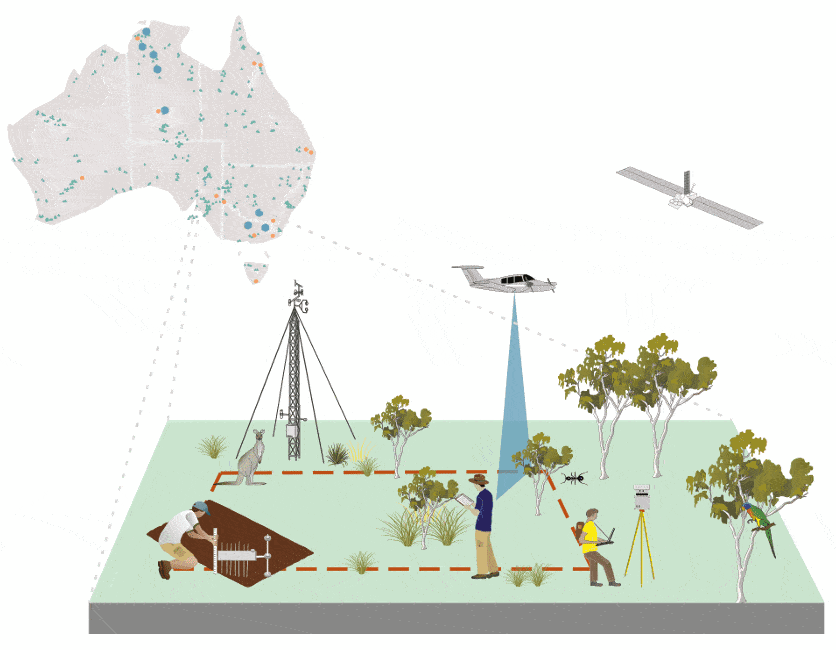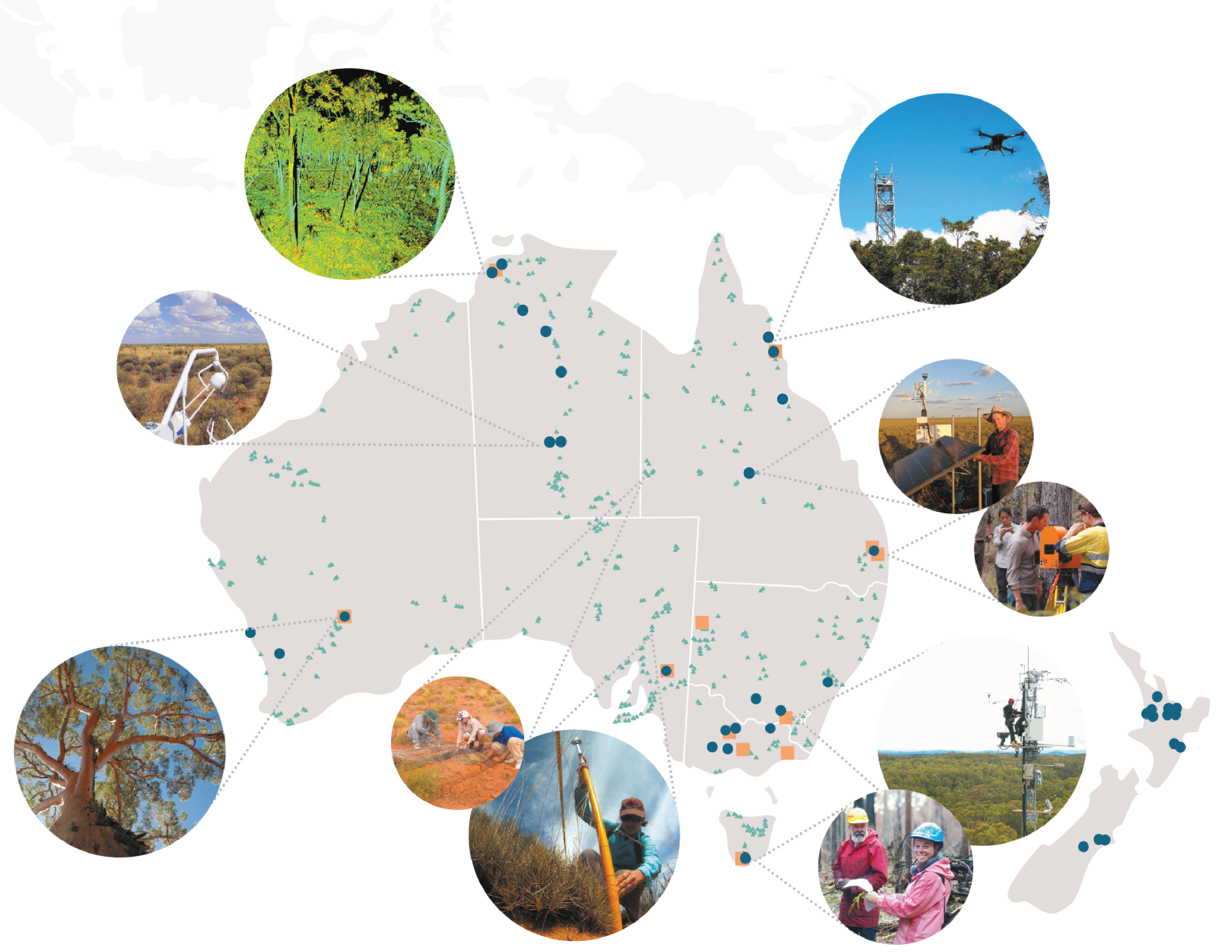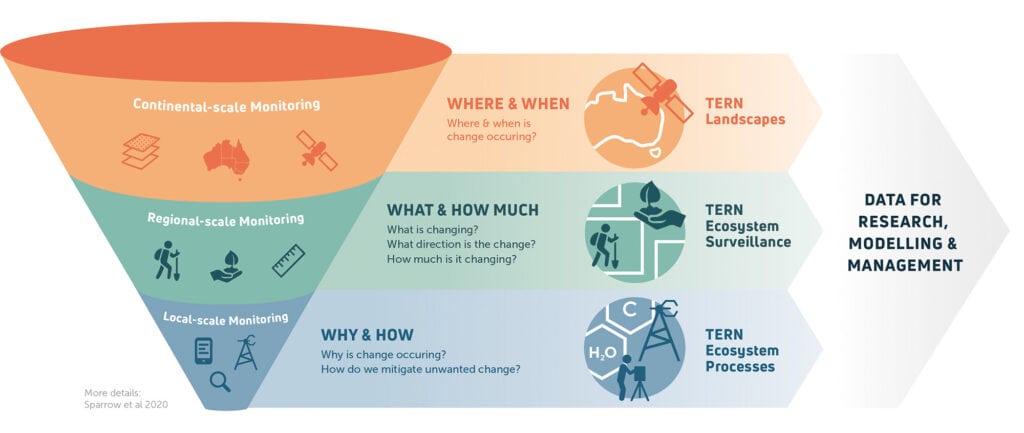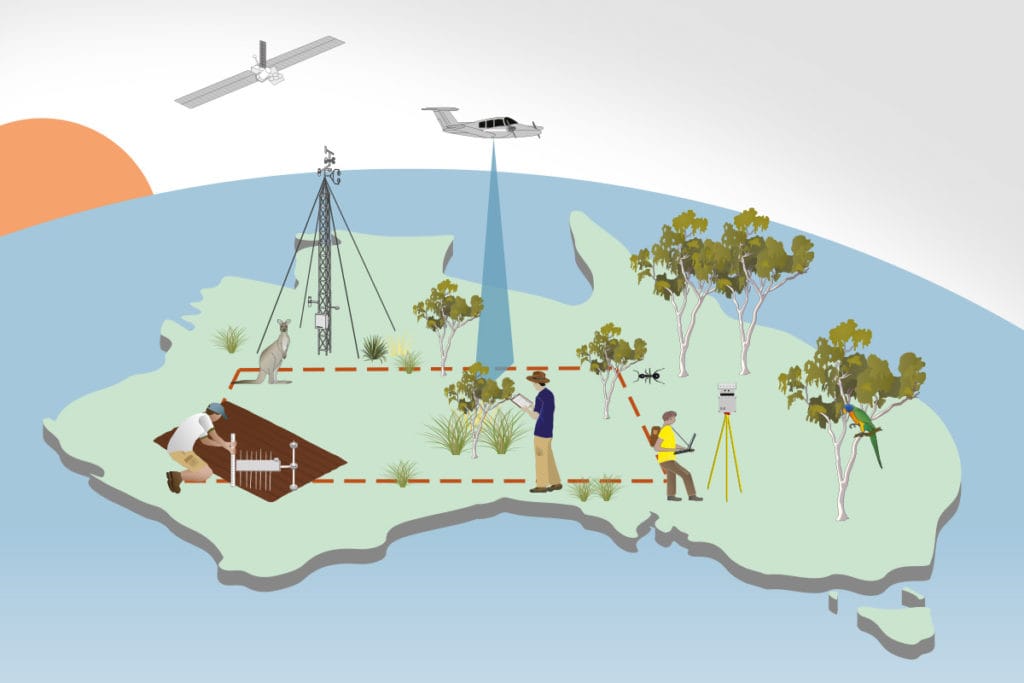About
Ecosystem observation, data collection, integration & delivery.
We are a field-based ecological research & land observatory using sensors, surveys and tools to produce data & analytics

- Eddy covariance flux towers; Heat flux plates; Radiometers; Anemometers; Infrared Gas Analysers; Spectrometers; CosmOz soil moisture meters; Groundwater bores; Ecoacoustic sensors; Phenocams; Terrestrial laser scanners; UAV/drones; Photopoints; & more…
- >100,000 catalogued plant & soil samples
- Standardised field monitoring methods
- Guidelines for calibration & validation
- Field data collection apps
- >40 continental-scale remote-sensing data products
- >30 soil & landscape attributes
- 30 min time-series micrometeorology data from >30 flux towers
- Phenocam & acoustic sensor data from 15 SuperSites
- Soil & vegetation survey data from >1000 plots
- Calibration & validation data for remote sensing
- Aggregated state government survey data for >98,000 plots
- Virtual desktop
- Data ingestion tool
- Visualisation

TERN measures key terrestrial ecosystem attributes over time from continental scale to field sites at hundreds of representative locations and openly provides model-ready data that enable researchers to detect and interpret changes in ecosystems.

We deliver quality environmental monitoring data, tools and expertise to researchers who are working to understand Australia’s environment and so enable its management for sustainable social and economic benefit.
TERN Environmental Reporting Australia
TERN Landscapes
Based on remote sensing techniques, TERN provides spatial data products at regional and continental scales of land, terrain and soil attributes to characterise and monitor Australian ecosystems over time.

TERN Ecosystem
Surveillance
TERN’s plot-based field monitoring capability tracks the direction and magnitude of change in Australia’s environments over time through sampling and surveying flora, soil and some invertebrates.

TERN Ecosystem
Processes
TERN’s ecological research & ecosystem reference sites, located in key Australian biomes, combine time series data streams from micro-meteorological instruments with observations on flora and fauna to provide insights into ecosystem processes.

TERN's Vision & Mission
TERN’s Vision
Continuously growing long-term national-scale Australian terrestrial ecosystem data used globally.
TERN’s Mission
Providing long-term preservation and access to analysis-ready data for researchers and decision makers to help Australia prepare for the future.
TERN's Principles
- TERN supports research leadership in terrestrial environmental monitoring and modelling for long-term national benefit.
- TERN’s fundamental purpose is to provide environmental monitoring and assessment infrastructure for the use of researchers, but it does not fund research projects.
- TERN provides foundational data and information products useful to researchers.
- TERN’s activities will support researchers’ priorities for fundamental ecosystem science and thereby the priorities of its funders.
Environmental monitoring and ecological research is designed to:
- measure parameters operating at vastly differing scales of space and time;
- enable concurrent assessment at multiple scales; and
- support upscaling and downscaling for modelling and prediction
- TERN’s work is directed towards the long-term task of monitoring, evaluating, modelling and predicting the status and trajectory of Australia’s ecosystems.
- TERN’s data and information products will integrate with monitoring conducted by related agencies.
TERN’s data and information products must be useful to and efficiently available for land management and policy-maker stakeholders, through whom learnings from research might achieve impact.
TERN will increase awareness of its facilities and data for the purposes of:
- ensuring optimal utilisation of its research infrastructure for world-class research by national and international collaborators; and
- engaging with end-users of research such as industry, business and government in support of informed decisions.

Science Questions
TERN’s field observatory and data collection are shaped by the science questions pursued by Australian environmental science researchers.
- How are our ecosystems responding to environmental pressures?
- How might positive trends be enhanced and negative consequences managed?
- How is our environment likely to alter in the future, for example in relation to a different rate of change in climate?
- How are significant environmental assets – soils, carbon stocks, water, vegetation and biodiversity – responding to such changes and to their management?
- How resilient are the ecosystem services upon which our society and many of our industries depend, such as soil health, nutrient cycling, fire mitigation, provision of clean water, crop pollination, carbon sequestration and the effect on disease transmission?






